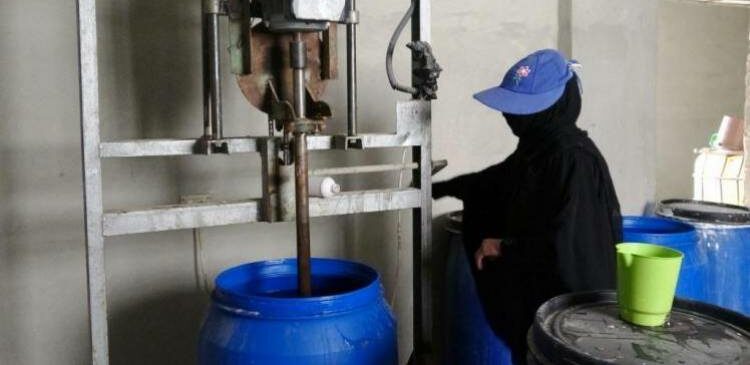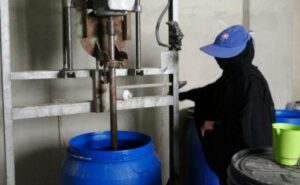Naya Detergent Factory was opened by Raqqa Municipality Women’s Bureau four months ago. Only women have worked in the factory. 40 percent of the factory’s income will be used for new projects promoting women’s employment.
Naya Detergent Factory was opened by Raqqa Municipality Women’s Bureau four months ago. More than a hundred women have worked for the factory to earn a living and 40 percent of the factory’s profits will be used for new projects promoting women’s employment. Moreover, 60 percent of the factory’s profits have been given to women having no income. The factory has been run by only women from production to packaging.
Hala El Abdullah, member of the Raqqa Municipality Women’s Bureau, is in charge of running the factory. “Our women’s bureau suggested founding the factory and it was opened under the supervision of our Health Bureau. The Health Bureau of the municipality controls the process of the production and the proportion of chemicals used in detergents,” Hala El Abdullah said.
Hala El Abdullah told us that they show attention to employ women, who need an income. “We first employed women, who lost their husbands in war, divorced women and women having no income. Women work six hours a day.”
Hana El Abdullah believes that women can work in every field and that social norms claiming, “Women cannot work” will be broken in Raqqa city soon. “We are working on a more colorful project to support women to take part in society and economic life more. Our detergent factory is the first and it is a model for our next projects.”
Hala El Abdullah told us that 40 percent of the factory’s profits will be used for new projects promoting women’s employment and 60 percent of the factory’s profits have been given to women having no income.
Khawla: I have economic freedom for the first time
39-year-old Khawla Abdel Waha Toma lost her husband and she has five children. Khawla has needed a regular income because one of her children has had heart disease since 2013. She began to work in the factory and she has had an income since then.
“I started working in the packing department. But I needed a regular income so I wanted to learn everything, from production to packaging. I took courses to learn more. I want to be professional in my job. I have had a regular income for the first time in my life. I have economic freedom for the first time and I don’t have to worry about tomorrow. I hope all women can have this freedom.”


